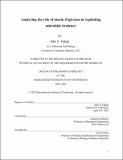Analyzing the Role of Mucin O-Glycans in Regulating Microbial Virulence
Author(s)
Takagi, Julie S.
DownloadThesis PDF (20.47Mb)
Advisor
Ribbeck, Katharina
Terms of use
Metadata
Show full item recordAbstract
Mucus is the principal ecological niche for the human microbiota, acting as an interface between the trillions of microorganisms residing in the mucosal surfaces of the body and the underlying epithelial cells. Here, mucus plays a fundamental role in host defense, maintaining complex communities of microorganisms and preserving host health. Defects in the production or glycosylation of mucins, the gel-forming component of mucus, are associated with microbial dysbiosis and infection; however, owing to the complexity of mucins, an understanding of the molecular motifs and mechanisms underlying mucins’ protective functions remains poorly understood. In this thesis, I fill this gap by investigating how mucins and their associated glycans influence microbial physiology in the opportunistic fungal pathogen, Candida albicans, and the gram-negative bacterial pathogen, Vibrio cholerae. First, I purify and characterize libraries of mucin-attached glycans and establish their role in influencing C. albicans pathogenicity, group behavior, and cross-kingdom interactions. Next, I determine the genetic mechanism of the glycanmediated response and identify individual synthesized glycans that are sufficient for mucins’ virulence attenuation. Lastly, I investigate the expression and production of virulence factors in the enteric pathogen, V. cholerae and demonstrate that mucin O-glycans, specifically Core 2- derived glycans, inhibit the major determinants of infectivity. Collectively, the work presented in my thesis provides a framework for characterizing the biochemical signals underlying mucins’ protective function and provides insight for the development of novel therapeutic and diagnostic tools for treating and preventing infection.
Date issued
2022-05Department
Massachusetts Institute of Technology. Department of BiologyPublisher
Massachusetts Institute of Technology